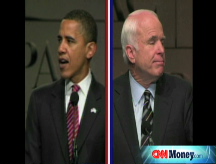Tax the giraffe!
Massachusetts is the latest state to close the "Geoffrey Loophole," a tax trick that lets big multi-state chains like Toys R Us duck millions in state taxes that independent rivals can't evade.
(Fortune Small Business) -- When the Massachusetts passed its much-delayed state budget last week, it included an obscure tax-law change that could be crucial for small-business owners concerned about unfair competition. By becoming the 22nd state to adopt "combined reporting" legislation, Massachusetts lawmakers are hoping to put a stop to a longstanding practice that, they say, gives large corporate chains an unfair advantage over their smaller competitors at tax time.
The maneuver in question has been dubbed the "Geoffrey Loophole," after the ubiquitous giraffe mascot of Toys R Us, one of the first firms to exploit it. Though the tax dodge in question has existed for decades, companies only first started taking utilizing it en masse in the early '90s, as large retail chains began expanding nationwide.
It works like this: First, a company sets up a subsidiary in a state such as Delaware that doesn't tax profits from intangible assets. It then assigns the rights to corporate trademarks to the subsidiary, and pays exorbitant licensing fees to use them. Since the subsidiary is fully owned by the company, the money just goes from one corporate pocket to another - but as the new pocket is tax-free, it can save a savvy company tens of millions in tax costs.
In addition to Toys R Us, which offloaded its trademarked giraffe to a Delaware subsidiary, other large chains using the trick includeHome Depot (HD, Fortune 500), Kmart, and Staples (SPLS, Fortune 500); Wal-Mart (WMT, Fortune 500) uses a similar strategy, directing each of its stores to pay "rent" to a company-owned real estate investment trust headquartered in Delaware, saving itself nearly $90 million a year.
For small businesses without interstate operations, though, the Geoffrey Loophole remains off-limits. Not only does this give big companies an unfair advantage, say critics of the tax device, it forces small business to shoulder a bigger share of the state tax burden. In Pennsylvania, the state revenue department estimates that multistate businesses save $493 million a year in taxes - more than a third of the entire sum paid out in state business taxes.
"Who ends up taking it the neck is probably that small- to medium-sized C corporation that doesn't have a big tax accounting and legal staff, or they don't want to engage in the shell game of having a board meeting in Delaware once a year," says Pennsylvania state assembly finance chair David Levdansky.
Levdansky and others have proposed eliminating the tax maneuver via "combined reporting," a procedure where companies are required to report earnings from all out-of-state subsidiaries on each state tax form. Massachusetts becomes the sixth state - joining Michigan, New York, Texas, Vermont, and West Virginia - to have switched to combined reporting in recent years. (Sixteen other states have always used combined reporting.)
In other states, though, including Pennsylvania, combined reporting bills have faltered - in large part thanks to the work of business groups such as state chambers of commerce and local chapters of the National Federation of Independent Business, which have opposed combined reporting as an unnecessary business-tax hike.
"I would say the 'loopholes' are legitimate transactions in today's marketplace," says Pennsylvania Chamber of Business and Industry tax policy expert John Callahan, adding that states with combined reporting end up with more litigation over tax bills.
Mostly, though, he says it would hurt the local economy by giving the state a reputation as a bad place to do business.
The Massachusetts Budget and Policy Center counters that five of the seven states with the fastest employment growth use combined reporting. And Levdansky notes that when Gov. Ed Rendell's business-tax commission proposed imposing combined reporting, it proposed simultaneously cutting the state business tax from 9.99% to 7.9%.
This, he argues, would be good not just for the majority of businesses that can't avail themselves of the Delaware dodge, but for the state economy as a whole: "There's a lot of opportunities that are missed simply because companies look at that 9.9% and have sticker shock."
"What's intriguing to me is that there's this rift opening up in the business community," says Stacy Mitchell, a senior researcher with the Institute for Local Self-Reliance and author of Big Box Swindle, a look at how large retailers work to quash independent competition.
When Maryland Gov. Martin O'Malley introduced a combined reporting bill last year, Mitchell says, "the Maryland Chamber of Commerce made it a top priority to defeat that - even though they claim to represent a lot of small businesses in that state who are undoubtedly having to compete against companies that have an advantage by virtue of the fact that they're not having to pay their full share of state income taxes."
State chapters of the nominally small-biz-focused National Federation of Independent Business have likewise fought against combined reporting bills in Pennsylvania, Iowa, and other states. Nationally, NFIB doesn't have a position on combined reporting, says its spokesperson Melissa Sharp: "This is an issue that really doesn't impact our members because the vast majority are too small to set up subsidiaries."
Small-business owners who feel they are impacted by the increased competition from tax-free rivals that the Geoffrey Loophole allows are increasingly banding together to buck the big lobbying groups: In Massachussetts, says Mitchell, more than 100 local business owners signed on in support of that state's combined-reporting bill.
"We wanted to really start putting out the education that this is not a level playing field in the state of New Mexico," says Vicki Pozzebon, director of the Santa Fe Independent Business Alliance, a group of about 600 area businesses that joined with local labor and advocacy groups to get a bill out of committee for the first time in New Mexico, though it has yet to pass the full legislature. "Why should our local businesses be paying the cost while these large corporations are not?" ![]()
Buy equipment now! 2008 tax breaks
Snipes' jail time: A tax-protest 'wake-up call'
-
The Cheesecake Factory created smaller portions to survive the downturn. Play
-
A breeder of award-winning marijuana seeds is following the money and heading to the U.S. More
-
Most small businesses die within five years, but Amish businesses have a survival rate north of 90%. More
-
The 10 most popular franchise brands over the past decade -- and their failure rates. More
-
These firms are the last left in America making iconic products now in their twilight. More










